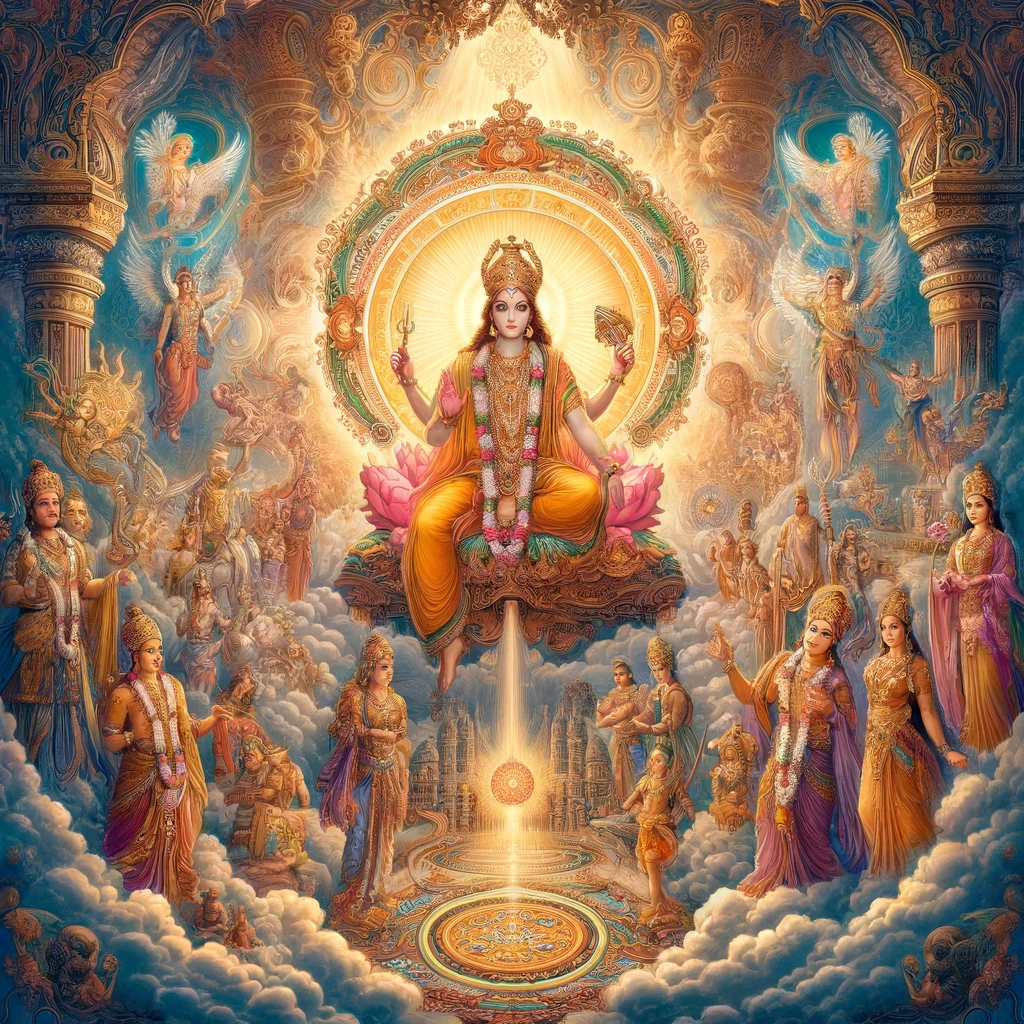ವಿಶ್ವಂ ವಿಷ್ಣುರ್ವಷಟ್ಕಾರೋ ಭೂತಭವ್ಯಭವತ್ಪ್ರಭುಃ |
ಭೂತಕೃದ್ಭೂತಭೃದ್ಭಾವೋ ಭೂತಾತ್ಮಾ ಭೂತಭಾವನಃ || ೧ ||
viśvaṃ viṣṇur vaṣaṭkārō bhūta bhavya bhavat prabhuḥ ।
bhūtakṛd bhūtabhṛd bhāvō bhūtātmā bhūtabhāvanaḥ ॥ 1 ॥
Vishwam (viśvaṃ)
The first Nama in Vishnu Sahasranama is Vishwam. As mentioned before Vishnu Sahasranama is the quintessence of all Vedas.
Here “Vi” also gives the meaning of Bird, “Shw “means moving. Hence the almighty God who has adopted the divinity of the Vedas “Garuda” as his vehicle is Vishwam.
Besides the meaning mentioned above there are ten other meanings of the nama Vishwam.
Chaturmukha Brahma is known as Vishwa. One who bears the creator Brahma in his navel (i.e. God) is also called Vishwam. The God bears the creator Brahma in his navel and through Brahma creates the universe. Hence the almighty God is called Vishwam.
The form of Mukya Prana is Lord Hanuman and he is also known as Vishwa.
The one who is Prana Shakti within Mukhya Prana and who gives movement to our Body, and one who enters our body as an image, and one who is omni present within and outside our body and one who is bliss knowledge the almighty God is Vishwam.
Vishnu (viṣṇur)
Usually most believe that Vishnu is associate with one person. However, what is believed by Hindus. Christians, and Muslim as almighty (God) is Vishnu. Meaning, he is Omnipotent, Omnipresent, and Omniscient. This transcends religion and is agreed by every religion that there is one God and he is Omnipotent, Omnipresent, and Omniscient.
Meaning one who is Omniscient and gives great knowledge (Vishista Wada Gnana). One who is Omnipresent inside our body, solving the endless cycle of birth, death, and rebirth, the pure breath which controls our action. Vishnu also means one who is Omnipotent to protect.
Vashatkaraha (vaṣaṭkārō)
God is also called Vashatkaraha is not known to many people. In olden days in Vedic tradition, in every home people used to worship Fire by offering purified ghee as a daily ritual. When offering purified ghee to the fire, one used to recite five mantras invoking Yagna Namaka, Yagna Purusha, Yagneshwara, Yagna Bhavana, and Yagna Boktha. The fifth invocation (Yagna Boktha) is God’s form Vashatkaraha.
Why is he called Vashatkaraha? He who when desired can create, sustain, and destroy the universe by six qualities namely: (1) Knowledge/Technical knowhow, (2) Energy, (3) Strength / Vigor, (4) Wealth – both Material and Sensory, (5) Courage, and (6) Radiance is called Vashatkaraha.
Bhuta Bhvya Bhavat Prabhuhu (bhūta bhavya bhavat prabhuḥ)
God will always protect the universe. He was present in the past; he is with us; and he will be present in the future to protect his creation. If we split this Nama (Character), it has four words (Bhuta+Bhavi+Bhavanti+Prabhu). The souls that have attained perfection (Satva) to reach Salvation are called Bhuta. Bhavi means family people, who seek material benefits (Rajasa). Bvanti means souls who are NOT perfect and cannot reach salvation (Tamasa). Hence, BhutaBhavyaBhavatPrabhu means the lord of all Souls (Satva, Rajasa, and Tamasa).
Hence the one who is the lord and was present in the past, present, and in the future and who controls Satva, Rajasa, and Tamasa souls is called BhutaBhavyaBhavatPrabhu.
Bhutakrut (bhūtakṛd)
The are two meanings for Krut. (1) Creation, and (2) Circle of Life and Death. In the same ways Bhuta has two meanings. (1) Immortal Soil, Fire, Water, Air, and Ether, and (2) Mortal Body composed of these immortal elements.
Bhutakrut means one who has created the immortal and mortal entities; one who has created the Universe made of these five immortal elements; and one who puts life in the mortal body to perform duties with attached-detachment (Yoga) to attain salvation.
Bhutakrut also means once who destroys immortal and mortal entities and the Universe.
Bhutabrut (bhūtabhṛd)
The one who bears the (a) five non-materialistic elements (energy) of creation, protection, and destruction, (b) five material elements of the universe, (c) five elements that our body is made of, and (d) one who bears the souls that have attained salvation is called Bhutabrut.
Bhavaha (bhāvō)
Creation, Protection, and Destruction is the God’s characteristics. Birth, Death, and in-between state is nature. Death succeeds Birth, Birth precedes Death. God is always present (i.e. he does not have birth, death, and in-between states). Bhava means Pure Bliss (Sachidananda Form).
Bhutatma (bhūtātmā)
The one who pervades the five elements i.e. Earth, Water, Fire, Air, and Ether and one who provides salvation to the Souls who is present in the body made of these five elements is known as Bhutatma.
Bhutabavanaha (bhūtabhāvanaḥ)
The one responsible for Creation, Protection, and Destruction of the Universe, and one who makes us experience Joy and Sorrow is known as Bhutabavanaha.


